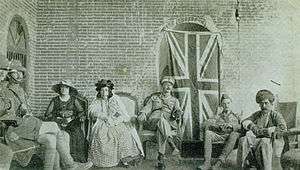Lady Adela
Lady Adela Jaff or Adela Khanem, called the Princess of the Brave by the British, was a famous and cultured chief of the Jaff tribe, one of the biggest Kurdish tribes, if not the biggest, native to the Zagros area, which is divided between Iran and Iraq. Adela Khanem was of the famous aristocratic Sahibqeran family, who intermarried with the tribal chiefs of Jaff.[1]
Lady Adela exerted great influence in the affairs of Jaff tribe in the Sharazor plain. She was born in 1847 to a leading family in Sanandaj, second largest city of Iranian Kurdistan. She married Kurdish King Osman Jaff, a chief of the Jaff tribe, whose headquarters was in Halabja. Later Osman Pasha was appointed the kaimakam of Sharazor, thus allowing Lady Adela to take over. The revival of commerce and restoration of law and order in the region of Halabja is attributed to her sound judgement. She was known for saving lives of many British army officers during World War I and was awarded the title of Khan-Bahadur by the British commander.She died in 1924 and buried in Halabja.

Gertrude Bell, British politician and writer, describes Adela Khanem in a letter in 1921 as follow: " The feature of Halabja is 'Adlah Khanum the great Jaff Beg Zadah lady, mother of Ahmad Beg. She is the widow of Kurdish King Osman Pasha Jaff, sometime dead, and continues to rule the Jaff as much as she can and intrigue more than you would think anyone could, and generally behave as great Kurdish ladies do behave. She has often written to me, feeling, I've no doubt, that we must be birds of a feather, and I hastened to call on her after lunch. She is a striking figure in her gorgeous Kurdish clothes with jet black curls (dyed, I take it) falling down her painted cheeks from under her huge headdress. We carried on in Persian, a very complimentary talk in the course of which I managed to tell them how well 'Iraq was doing under Faisal and to assure them that all we wished was that our two children, 'Iraq and Kurdistan, should live in peace and friendship with one another". Vladimir Minorsky has reported his meeting with Lady Adela in the region of Halabja in 1913.
Major Soane wrote about her in his book To Mesopotamia and Kurdistan in Disguise: "a woman unique in Islam, in the power she possesses, and the efficacy with which she uses the weapons in her hands.... In a remote corner of the Turkish Empire, which decays and retrogrades, is one little spot, which, under the rule of a Kurdish woman has risen from a village to be a town, and one hill-side, once barren, now sprinkled with gardens; and these are in a measure renovations of the ancient state of these parts."
See also
References
- Cecil J. Edmonds, Kurds, Turks and Arabs: Politics, Travel and Research in North-Eastern Iraq, 1919-1925, London, 1957. ISBN 0-404-18960-1
- Ely Banister Soane, To Mesopotamia and Kurdistan in Disguise, London 2007, ISBN 1-4021-5914-5
- Lukitz, Liora, A Quest in the Middle East: Gertrude Bell and the Making of Modern Iraq (I.B. Tauris, 2006) ISBN 978-1-85043-415-3
- Minorsky, The Tribes of Western Iran, The Journal of the Royal Anthropological Institute of Great Britain and Ireland, pp. 73–80, 1945.
- Ely Banister Soane, Report on the Sulaimania district of Kurdistan. 1910
- Ely Banister Soane, Notes on the Southern Tribes of Kurdistan, Civil commissioner, Baghdad. 1918
- Personalities in Kurdistan, Civil Commissioner, Baghdad. 1918
Bibliography
David K. Fieldhouse (9 February 2002). Kurds, Arabs and Britons: The Memoir of Col. W.A. Lyon in Kurdistan, 1918-1945. I.B.Tauris. ISBN 978-1-86064-613-3.